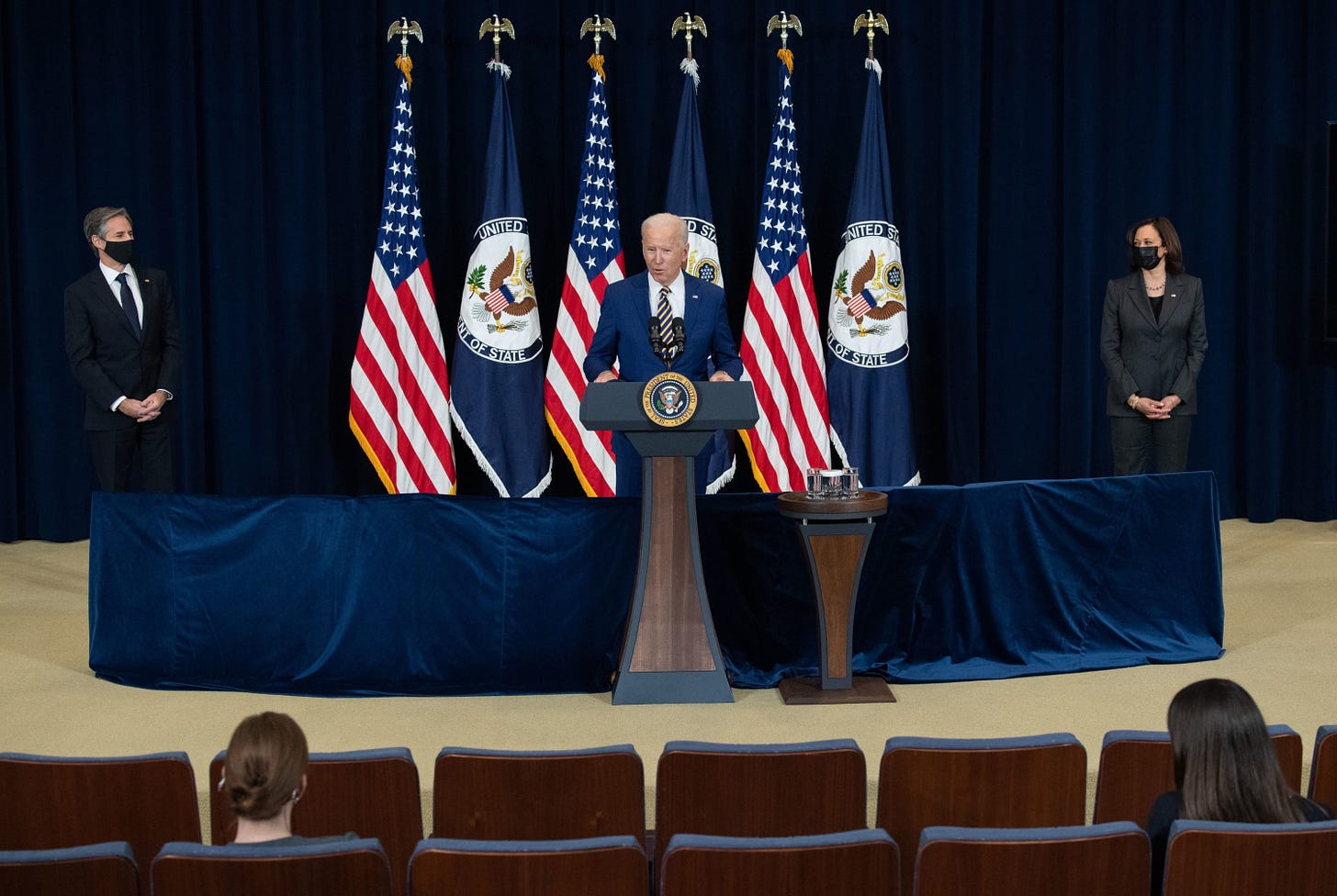How Biden Can Be the First Post-Post-Cold War President
His maiden foreign policy speech showed a willingness to level with the American people about the world as it is.

President Biden’s first foreign policy address at the State Department Thursday ended with a novel message: He will pursue a “foreign policy for the middle class.” While his speech included its fair share of important policy announcements, the most critical portion was rhetorical. He provided vivid examples of how his approach to the world—and U.S. global engagement generally—will benefit working American families. While talk of acting in the “national interest” isn’t new, the president began today what could be a renaissance of presidential communication on America’s role around the globe.
Biden could be the first president since the end of the Cold War to communicate clear foreign policy goals to domestic audiences. Thursday’s speech should be the beginning of an enduring domestic messaging campaign, aimed at reinvigorating a healthy and realistic national awareness of American global engagement.
As previous presidents have done, Biden used the occasion of his speech to communicate American policy to those aboard, who were no doubt listening intently. After telling the world that “America is back” and “Diplomacy is back,” he honed in on rising authoritarianism. He forcefully condemned the recent military coup in Myanmar, which was justified with baseless claims of a fraudulent election. Without directly addressing the capitol riot, the president decried any attempt to subvert the results of a democratic election with violence. He outlined his administration’s willingness to hold Russia to account for human rights abuses like the imprisonment of opposition leader Alexei Navalny, and he warned against further interference in American democracy. He promised to challenge Russia and China while finding common ground where it is in America’s best interest, beginning with a five-year extension of the New START nuclear treaty. He didn’t back away completely from campaign rhetoric: A strong foreign policy, he argued, requires “building back better” here at home.
But notably, Biden tied domestic crises to global affairs throughout his remarks: The domestic climate crisis can only be mitigated through global cooperation; stopping future pandemics means global cooperation to surveil for new diseases.
We’ve grown used to the idea that statecraft is the domain of experts alone, but that wasn’t true as recently as the Cold War. Presidents often used rhetoric to win support for their foreign policies among domestic audiences, explaining how seemingly distant issues mattered to voters. In 1947, President Truman made the case to the public that financial assistance to European states was vital to the “security of the United States.” President Kennedy’s famous “Ich bin ein Berliner” line was as much for American consumption as for West Germans—he explained “the great issue between the free world and the Communist world” and what it meant for free Americans. President Reagan’s famous “evil empire” speech rallied the American public to rise to the “challenge” and “ultimately triumph” over communism.
But with the notable exception of the years immediately after 9/11, post-Cold War presidents have done little to consistently communicate with the public on issues of foreign affairs. The public, it turns out, was listening—and they heard presidential silence. That silence created a void, which was filled with the ignorant xenophobia of "America First" on the right and another form of naïve isolationism on the left.
The changes in news media since the fall of the Berlin Wall makes it harder for nuanced, erudite messages to break through to a polarized public. But that's why it's crucial that Biden use whatever power remains in the bully pulpit to fill the 30-year gap with consistent and robust communication on foreign policy issues. Biden recognizes that the bulk of our current domestic challenges—the coronavirus, economic inequality, expanding authoritarianism, and climate change—are global in nature. Where Biden’s immediate predecessor too often treated foreign affairs as at best a series of opportunities to score political points and at worst a playground for corruption, the new administration should continue to engage the American public and explain how his plan to address our domestic challenges is tied to his foreign policy vision.
Even if Biden’s foreign policy will be nuanced and careful, his communications strategy must be aggressive. If the United States is to confront the myriad crises and generational challenges that currently confront it, it will require adept political leaders: politicians who can use rhetoric to create legitimacy, who can galvanize public support and help people accept difficult truths.
No president since the end of the Cold War has been in as advantageous a position as Biden to do so, and his first foreign policy address as president was a promising start. But he can’t let off the gas. Whatever it means to craft a “foreign policy for the middle class,” the president should make sure the middle class hears about it.



